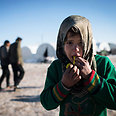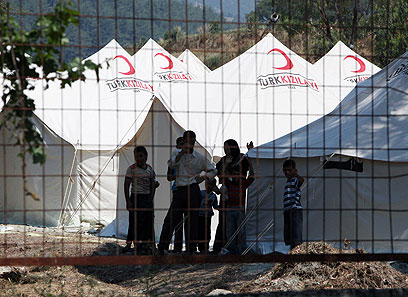
It is also then that this emaciated, green-eyed refugee leaves her mother and sisters in a shabby apartment and heads to a mosque in the posh part of the capital. Holding her younger brother by the arm, she patiently waits for the prayers to end so she can start begging.
Related stories:
- UN: Number of Syrian refugees tops 1.5 million
- Jordan opens its first Syrian refugee camp
- Israeli raising funds to help Syrians 'dying near us'
“People are more generous during Ramadan,” the 10 year old refugee told The Media Line, dressed in a torn red blouse and dirty black trousers, and standing barefoot outside the mosque.

Syrian refugees (Photo: EPA)
Islam mandates charity for the poor during this month, as well as fasting and increased prayer. Ramadan commemorates the revelation of the Muslim holy book, the Quran, to the Prophet Mohammad.
In this large mosque made of limestone, well-off worshipers arrive in expensive cars to pray before heading home to break their day-long fast. Fatima says her mother and sisters did not want to come begging with her.
“My two big sisters are shy. They do not want to leave home, but I do not mind. We need money to eat. Nobody is helping us enough,” said the young refugee, who managed to collect $14 before departing downhill with her younger brother through the dark allies of the capital.
Jordan says it is facing an uphill battle to provide for the more than half a million Syrian refugees that have fled the civil war in Syria. The government has appealed for more aid from the international community, but officials say the donations are still far less than they are spending on the refugees.
The cash-strapped kingdom set up three refugee camps with the help of wealthy Gulf countries such as Qatar and some European donors. The largest camp, Al-Zaatari, near the Syrian border, houses nearly 150,000 refugees in large white tents.
Refugees living in camps receive food rations, but others who live in the cities are struggling to adapt to life in Jordan. Ahmed Abel Rahman, a Syrian activist who provides aid to families outside the refugee camps, said organizations are finding it harder to needed aid.
“Restaurants are charging more for Ramadan meals and local authorities prevent us from entering the camp to provide aid directly to refugees,” Abel Rahman told the Media Line.
Public shame
In the northern city of Ramtha, near the Syrian border, the Ahel Il-Ketab Wal Suna, an Islamic charity organization, has erected tents and provided food and drink for Syrian refugees to break their fast. But organizers admit many Syrians are embarrassed to come to the Ramadan tents, not wanting to publicly admit their poverty.
“Last year, we had to close many tents because nobody wanted to come. Syrians, although needy, feel humiliated to publicly ask for food. Single men and some Arab expatriates visited our tents to eat,” Mohammad Zubi, of the charity said. “We hope this year more people will visit our tents.”
Zubi said aid organizations would like to distribute food to families at home, but logistics and a lack of resources makes it very difficult.
“We cannot make home delivery to each and every family in Ramtha. There are thousands and our resources are limited,” Zubi told the Media Line.
Emotions run high among refugees during the holy month, as they recall past Ramadan’s back home when the table was full of food and the extended family.
“We used to have all my brothers and sisters surrounding the table and food in abundance. Now, my family is scattered and the food we get is not enough to feed us,” Abu Abdel Rahman, an injured rebel from Deraa and a father of six, who currently lives in Ramtha told The Media line. “Now the feeling of dependency on aid groups is worse than death.”
He also accused aid groups and the Jordanian government of taking advantage of the refugee’s difficult situation to make profits.
“Where does all the money that comes for refugees go? We do not see anything,” he told the Media Line. His wife managed to cook a meager meal of rice and vegetables to break the fast. But Abu Abdel Rahman could not hide his feelings and anger.
“We have not seen meat or chicken for weeks. My children are becoming sick due to lack of proper food,” he charged.
Many of the refugees here say that by next year they hope to be back home in Syria, and reunited with their extended families.
Article written by Adam Nicky
Reprinted with permission from The Media Line
- Receive Ynetnews updates
directly to your desktop















